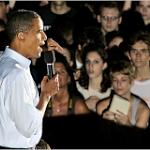Why America's Top Students Tune Out the GOP
 In good universities across the nation, students flee the Republican Party. And the better the universities, it seems, the more drastic the trend.
In good universities across the nation, students flee the Republican Party. And the better the universities, it seems, the more drastic the trend.
This is part 2 in a series. Click here for part 1.
Overall, the picture that emerges is alarming for Republicans and conservatives. In good universities across the nation, students flee the Republican Party. And the better the universities, it seems, the more drastic the trend.
To simplify: Republicans have gone from having a clear advantage among top students in the decade following the Eisenhower administration, to being competitive under the Nixon and Ford administrations, and from being an energetic minority during Reagan and Bush Sr. to being almost eradicated today.
So if we accept that the trend is drastic, that it is real and applies to most of the top universities – and I think that is reasonable – the next question is: How did this come about?
Some on the right see in these numbers a brainwashing effort from “liberal elites” on Ivy League institutions, rather than a brain drain from the Republican Party. People like David Horowitz try to gather evidence of how liberals conspire against conservative professors and students. To me, these accusations seem not only often to lack any real evidence, but also to lack substantial explanatory power, even when correct. Even conservative professors find themselves surrounded by students who vote for the Democrats. Furthermore, while students have fled the Republican Party, they do not seem to have moved very far to the left. The Weathermen are long gone. Hippies, utopian Marxists, socialists, anarchists – groups that were prominent in the 1960s and 1970s – are marginal today. Rather, today's best students identify as slightly to the left of center, policy-wise liberals who massively prefer the Democratic party.
If not brainwashing, then what? Partly, it has to do with a change in the youth vote overall – however, that is hardly much of a comfort to Republicans, but rather a source of additional worry, since it bodes ill for Republicans over the coming decades. This change, in turn, has to do with cultural changes relating to gender, sexuality and the role of religion in public debate.
Partly it has to do with the inclusion of new groups in top education institutions, first Blacks and Hispanics, followed by Asians over the last few decades. However, in the case of Asian students it could be argued that Asians trend towards the Democrats precisely because they have higher quality education.
Let me advance another hypothesis. Today's top students are motivated less by enthusiasm for Democrats and much more by revulsion from Republicans. It's not the students who have changed so much. It's the Republicans.
And here is where Applebaum's point gains its force.
Under Presidents Eisenhower and Nixon, Republicans championed science and knowledge. But over the past 30 years, national Republicans have formed an intensifying alliance with religious conservatives more skeptical of science and knowledge. I don’t know whether discarding evolution goes against common sense; but I’m pretty sure it goes against most Ivy League-educated senses.
To advance this alliance, national Republicans have derided elite universities as dangerous and hostile places. (Sometimes with painful insincerity. The senior Bush attacked Michael Dukakis as a Massachusetts liberal formed by the “Harvard boutique.” When asked how he reconciled his attack on elites with his own Yale education, he lamely responded that Yale was not a national symbol in the way that Harvard was. Yale’s reputation, Bush said, was “so diffuse, there isn’t a symbol, I don’t think, in the Yale situation, any symbolism in it. Harvard boutique to me has the connotation of liberalism and elitism.” He went on to explain that Harvard did not refer to class, but rather was an abstract term meant to signify “a philosophical enclave.")
In the age of Fox News and the Tea Party, the cultural war has heated up, and the anti-academic and anti-science rhetoric has intensified. No doubt, Democrats try to use these trends to their advantage, as evidenced by the use of the O’Donnell video – Democrats circulated a version of the video which omitted the follow up: “I didn’t inherit millions, like my opponent.” They wanted her to seem like an anti-academic candidate, rather than someone who has come far despite lacking inherited privilege. But the reason they succeeded, I think, is that there is too much truth in the pre-existing perception of Republican anti-academic rhetoric.
Educated people may also be extra-sensitive to policy positions that do not make logical sense. While individual elements of the Republican platform can make sense on their own, the combination of demands to reduce the deficit, plus increase Medicare spending, plus opposing reform meant to save costs, plus uncompromising insistence on tax cuts just does not add up. Granted, Democrats have also behaved irresponsibly in opposition. Still, I think it's fair to say that over the past decade, the Republicans have convinced educated America that they are the less policy serious party.
Click here for part 3.